Depression and Mediterranean-Style Diet
Length: • 4 mins
Annotated by Zakhar
Transcript
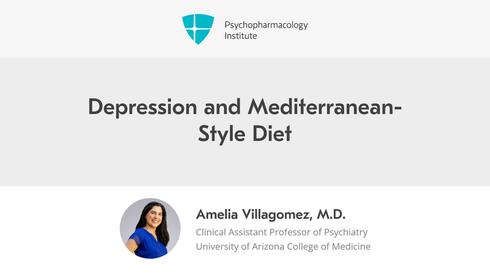
The Mediterranean diet is a way of eating that's based on the traditional cuisines of Greece, Italy, and other countries that border the Mediterranean Sea. Plant-based foods such as whole grains, vegetables, legumes, fruits, nuts, seeds, herbs, and spices are the foundation of the diet. Olive oil is the main source of added fat. Fish, seafood, dairy, and poultry are included in moderation. Red meat and sweets are eaten only occasionally.
References:
- Jacka, F. N., O'Neil, A., Opie, R., Itsiopoulos, C., Cotton, S., Mohebbi, M., Castle, D., Dash, S., Mihalopoulos, C., Chatterton, M. L., Brazionis, L., Dean, O. M., Hodge, A. M., & Berk, M. (2017). A randomised controlled trial of dietary improvement for adults with major depression (the 'SMILES' trial). BMC Medicine, 15(1), 23.
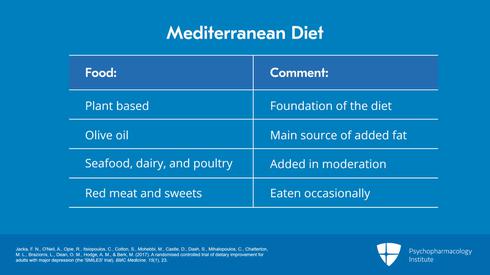
The first study is the SMILES trial which aimed to study the effects of a Mediterranean diet on depression. This 12-week study enrolled 67 individuals with moderate-to-severe depression. The active arm consisted of seven individual nutritional consulting sessions by a clinical dietitian. The control arm was supportive therapy where they came together and talked about hobbies and interests. Interestingly, 32% of patients achieved full remission after changing their diet versus 8% in the control group. The number needed to treat for remission in this study was 4.1. Therefore, four people needed to be given this diet for one of them to achieve remission over what would have been expected in the control group. As a comparison, the number needed to treat for SSRIs or SNRIs for remission of depression is approximately 7.
References:
- Jacka, F. N., O'Neil, A., Opie, R., Itsiopoulos, C., Cotton, S., Mohebbi, M., Castle, D., Dash, S., Mihalopoulos, C., Chatterton, M. L., Brazionis, L., Dean, O. M., Hodge, A. M., & Berk, M. (2017). A randomised controlled trial of dietary improvement for adults with major depression (the 'SMILES' trial). BMC Medicine, 15(1), 23.
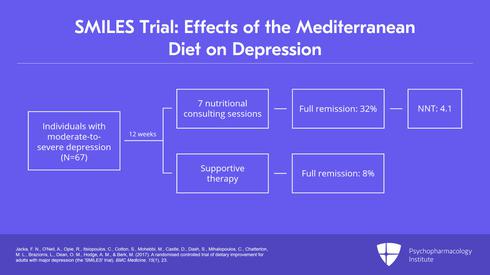
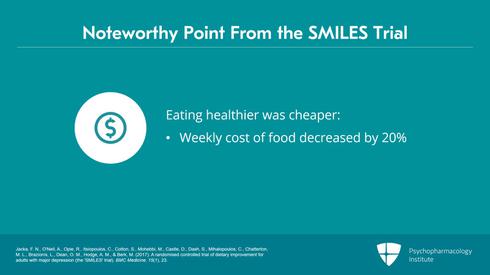

In this next study, young adults with elevated levels of depressive symptoms with a poor diet were randomized to a three-week intervention. The active group received a three-week intervention which consisted of watching a 30-minute video reviewing The Australian Guide to Healthy Eating and Recommendations. To increase concordance with Mediterranean-style diet, participants were instructed to increase intake of vegetables, fruits and whole grain cereals, fish, nuts, seeds, olive oil, spices such as turmeric and cinnamon, and to decrease processed sugar, fatty and soft drinks.
References:
- Francis, H. M., Stevenson, R. J., Chambers, J. R., Gupta, D., Newey, B., & Lim, C. K. (2019). A brief diet intervention can reduce symptoms of depression in young adults - A randomised controlled trial. PloS One, 14(10), e0222768.
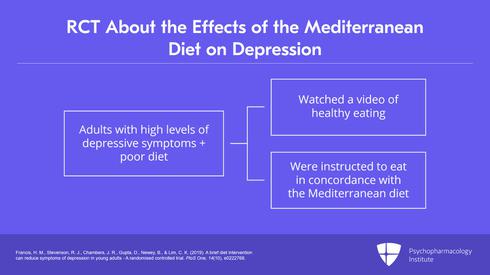

The group receiving the nutritional intervention had improvement of depressive symptoms that maintained at three months. This study illustrates that with a low-intensity intervention, I mean these people just watched the video and got a few phone calls, even with this low intervention, dietary patterns can change and result in mood improvement.
References:
- Francis, H. M., Stevenson, R. J., Chambers, J. R., Gupta, D., Newey, B., & Lim, C. K. (2019). A brief diet intervention can reduce symptoms of depression in young adults - A randomised controlled trial. PloS One, 14(10), e0222768.
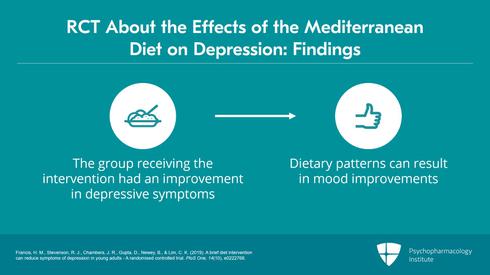
Illustrated here is the drop of depressive symptoms measured using the Depression, Anxiety, and Stress Scale in the group on the Mediterranean-style diet. The diet group had lower self-reported depressive symptoms and a large effect size of 0.75. And we can see that in this graph that the improvement was maintained at three-month follow-up. With this effect size, this dietary intervention is at least on par with antidepressant effect size.
References:
- Francis, H. M., Stevenson, R. J., Chambers, J. R., Gupta, D., Newey, B., & Lim, C. K. (2019). A brief diet intervention can reduce symptoms of depression in young adults - A randomised controlled trial. PloS One, 14(10), e0222768.

The last RCT that we're going to discuss is in young adults with moderate-to-severe depression where they compared the effects of befriending therapy versus a 60-minute appointment with a clinical nutritionist to support optimal adherence to a Mediterranean diet at baseline, 6, and 12 weeks, so just 180 minutes total of clinical time.
References:
- Bayes, J., Schloss, J., & Sibbritt, D. (2022). The effect of a Mediterranean diet on the symptoms of depression in young males (the "AMMEND: A Mediterranean Diet in MEN with Depression" study): A randomized controlled trial. The American Journal of Clinical Nutrition, 116(2), 572–580.
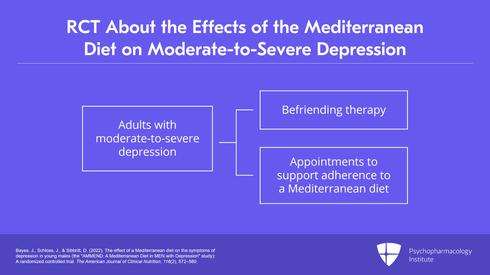
There was a significant decrease in the depressive scores measured by a Beck Depression Inventory-II in the Mediterranean diet compared to the befriending group. In the graph, the blue represents the Mediterranean group and the orange, the befriending group. By week 12, the participants in the Mediterranean diet group had a 20-point drop in their BDI-II score versus only a 6-point drop found in the befriending group. Now, as a reference, participants began with a BDI score consistent with severe depression and ended the study with an average BDI-II score consistent with mild symptoms.
References:
- Bayes, J., Schloss, J., & Sibbritt, D. (2022). The effect of a Mediterranean diet on the symptoms of depression in young males (the "AMMEND: A Mediterranean Diet in MEN with Depression" study): A randomized controlled trial. The American Journal of Clinical Nutrition, 116(2), 572–580.
